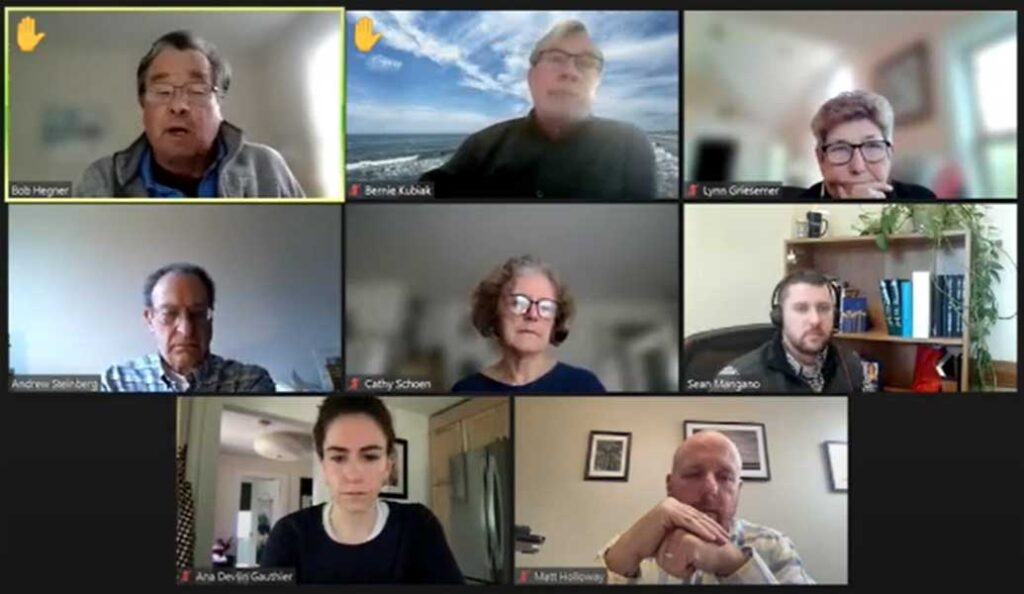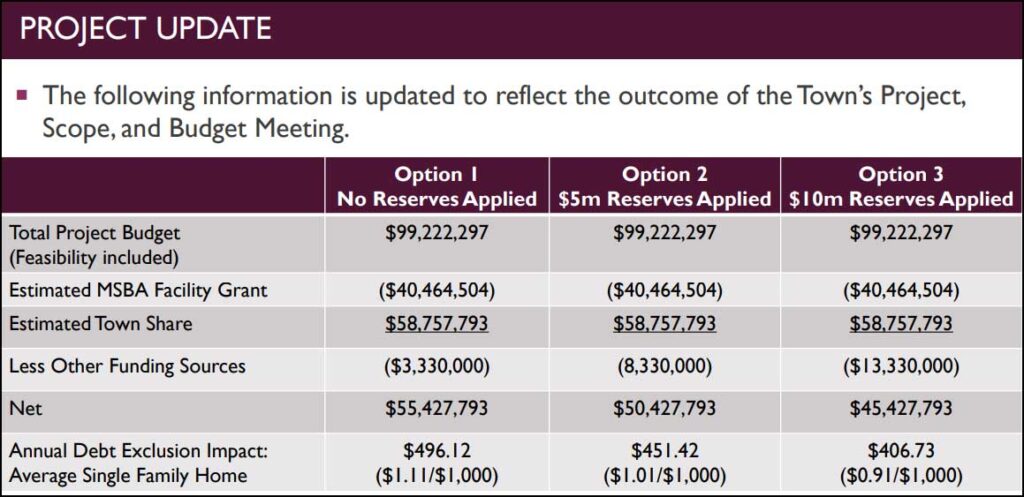Confusion Reigns At March 28 Finance Committee Meeting: No Recommendation Made On Lowering Override

Finance Committee Meeting of March 28, 2023. Source: amherstma.gov
Legality of Changing School Appropriation Questioned
One day after a Town Council Meeting where discussion got bogged down on whether a non-binding motion by Councilor Ellisha Walker complied with Massachusetts Open Meeting Law, a meeting of the Finance Committee became derailed taking up the same motion.
On March 27, during a discussion of whether an additional $5 million should be taken from the town’s reserves to reduce a debt override needed to pay for a new Fort River Elementary School project, Walker moved that the Council “suggest that the Finance Committee consider the use of an additional five million dollars from the capital stabilization account to be included in the debt authorization.”
At first ruled out of order by Council President Lynn Griesemer because no motion had been specifically noted in the meeting agenda, the council voted 6-3 with 4 abstentions to allow the motion, one argument being that it was appropriate under Items Not Anticipated by the Chair 48 Hours in Advance.
The Town Council adjourned with the understanding that the Finance Committee would follow through on Walker’s motion and make a recommendation on whether $5 million from capital stabilization could be added to a $5 million use of reserves previously recommended. The purpose of both $5 million allocations is to reduce the amount of borrowing required for the school project, thereby reducing the tax increase needed to finance the project.

That is where imbroglio #2 began.
Walker, who is one of the five town councilors who serve on the Finance Committee was unable to attend the meeting because it was held at three o’clock in the afternoon when she had a work commitment. So Griesemer agreed to make a motion on her behalf.
Griesemer first asked Finance Director Sean Mangano exactly how much money was in the capital stabilization fund. Mangano answered that the amount changes because some of the funds are invested in vehicles that fluctuate in value. He suggested using the $9,287,465 that was first moved from free cash and general stabilization to create the capital stabilization fund.
Griesemer was recognized. “I move to ask the Town Manager to amend (financial order FY23-06C) or issue a new financial order that includes taking from the capital stabilization fund the amount of $9,287,465.
Elementary School Building Committee Chair, Cathy Schoen seconded.
Speaking to the motion, Griesemer acknowledged that it was a painful one to make, given that it uses stabilization money previously earmarked for a future fire station that she has long been involved in planning.
“The most important decision is that we build this school,” she said. “If this is what it takes to get enough votes build this school, then I just have to say that I pledge to do everything I can, and will continue to do, to bring in other reserves to build our other [three building] projects. … I just feel that we need to get onto the real issue and that is to pass this school vote.”
Finance Committee Chair Andy Steinberg reported that Griesemer’s motion, which would alter a previous financial order made by the Town Manager, might be illegal since it may be increasing the amount ordered, which is prohibited by Massachusetts General Laws Chapter 44, Section 32.
Schoen observed that only a component of the order would be changed and not the total amount of $97,492,297 for the entire school project. Steinberg said that staff was seeking a clarification from the town attorney.
Discussion of using the additional $5 million from reserves continued. Matt Holloway, who is one of three non-voting resident members of the Finance Committee and who co-chairs the Vote Yes For Amherst Schools advocacy group commented that he appreciates the sentiment behind Walker’s motion, but does not favor using reserves to solve Amherst’s housing affordability problem.
“I do speak to the occasional voter who is not in favor of the school building project, and it is usually because of the cost” he noted. “I can say fairly confidently that these are folks who are unable to support an additional cost of about $450 a year in property tax. I do not believe they will change their vote from a ‘No’ to a ‘Yes’ on May 2 on the basis of a $45 savings, or whatever the relevant savings is for them.”
Resident member Bob Hegner cautioned against allowing the discussion of how to fund the new school to cause the type of division that Amherst saw in 2017 when a borrowing authorization vote for a new Wildwood School was defeated in a town wide referendum.
“I don’t want to spend any more stabilization money on this project,” stated resident member Bernie Kubiak. “I understand we have a high tax rate. … Our fiddling around with this basically let us pass by a historically low interest rate environment,” he said.
Schoen echoed Hegner’s concern about dividing the town. She said she would go anywhere that others are willing to unite around the question of using reserves.
Finance Committee member Ana Devlin Gauthier expressed concern that dipping further into capital stabilization would delay building the proposed fire station. She felt that people who will feel the squeeze of increased tax payments would be better served by other mechanisms such as Community Development Block Grants and Community Preservation Act disbursements.
During public comment Vince O’Connor suggested that the Fort River building project is “a clean plan” compared with two recent plans for new schools that were defeated. “If this project fails, all I can say is that you should forget about all the other projects until you can bring it back and make it succeed,” he said. “Perception is everything,” he added.
Town Councilor Dorothy Pam commented on the importance of funding the school project and assured that Amherst finances are in good shape. “I don’t want people to think that because we’re giving an additional $10 million to the school that we’re being fast and loose with the money, because we’re not,” she said.
Amherst resident Jenny Kallick asked if the next Finance Committee meeting could be held at a time when Councilor Walker could attend. Steinberg responded that he intended to pursue this.
The Finance Committee spent the remaining thirty minutes debating whether or not it was advisable to take action on Griesemer’s motion, given the procedural questions that surround it. Amherst’s Home Rule Charter dictates that a new financial order would require a subsequent review by the Finance Committee followed by a public forum, possibly delaying the decision.
Observing the amount of confusion over the correct process, Mangano advised that it may make sense to postpone a decision on the additional $5 million from reserves until next Monday, April 3, when there is a Finance Committee meeting scheduled. That meeting will follow a public forum on the debt authorization previously recommended by the committee – to take $5 million from stabilization that is expected to be replenished with energy credits, but does not include the full $9.3 million. An opinion from the town attorney on the correct procedure is also expected by that time.
Ultimately Griesemer moved to postpone a decision on her motion until April 3 when the Finance Committee reconvenes. The postponement vote passed with unanimous approval.
“Writing this up is going to be a real challenge,” admitted Steinberg.
